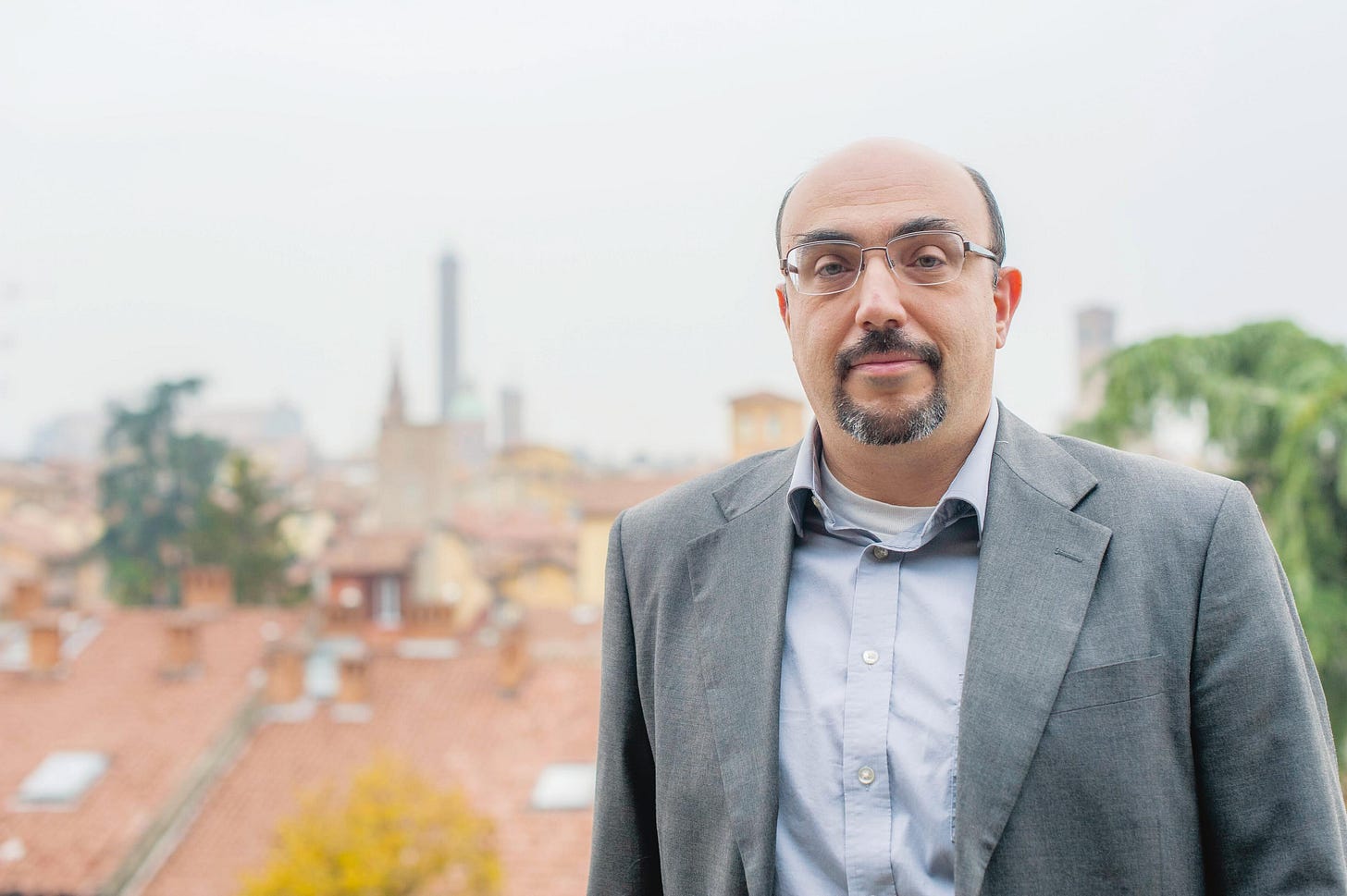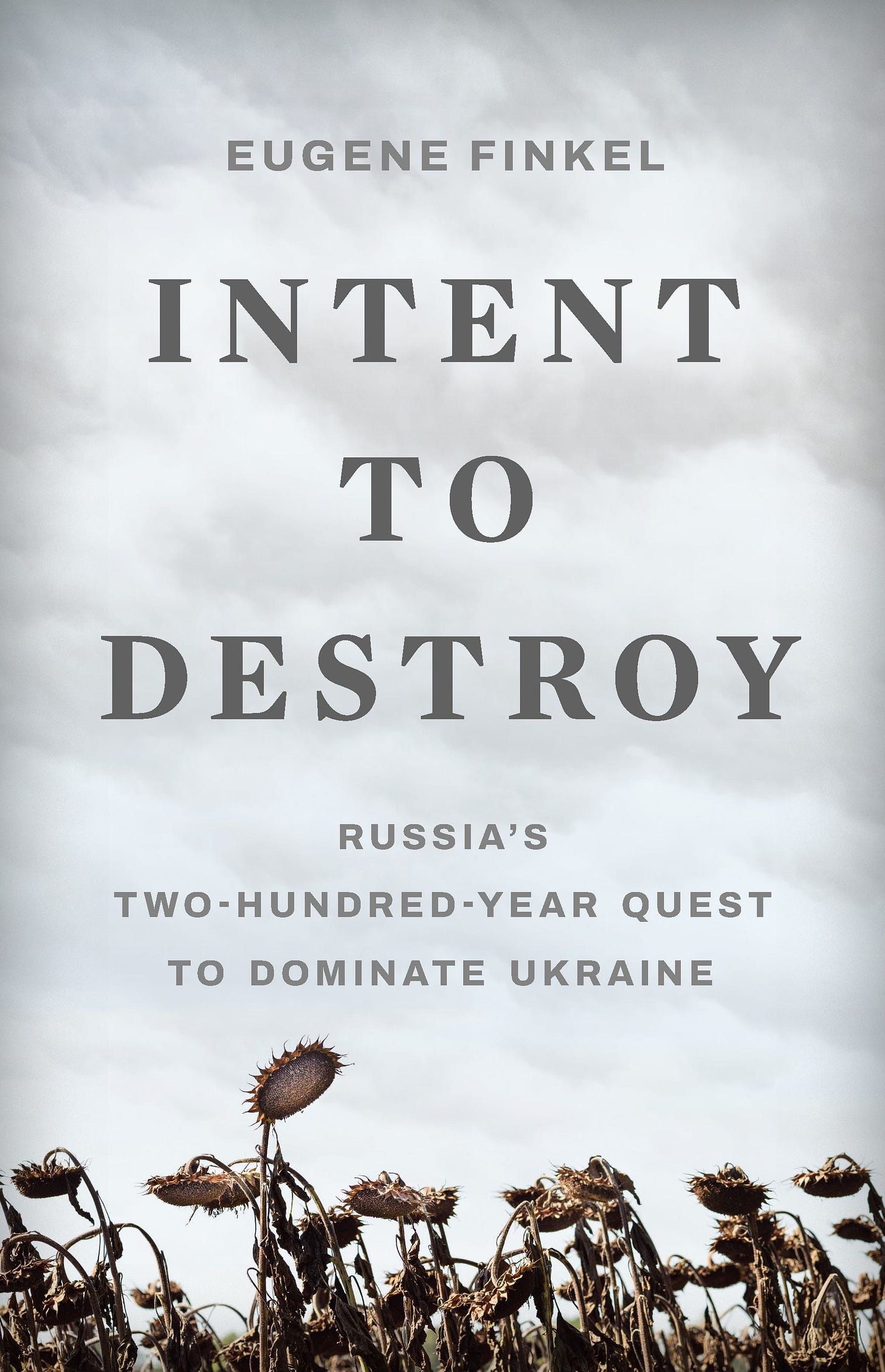Q&A: A Genocide Scholar Traces Russia's 'Intent' To Destroy Ukraine
Professor Eugene Finkel had a student who turned out to be a Russian spy. Writing a book on Russian violence was his way to 'fight back.'

Eugene Finkel is the Kenneth H. Keller Professor of International Affairs at the Johns Hopkins University School of Advanced and International Studies in Bologna, Italy. He is the author of a new book, Intent to Destroy: Russia's Two-Hundred-Year Quest to Dominate Ukraine. Finkel, who was born in Soviet Ukraine and grew up in Israel, traces Russia's invasion -- and the genocidal tactics seen in Bucha and Mariupol -- back centuries. Engaging in killings, deportations, starvation and cultural destruction against ethnic Ukrainians and minorities including Tatars, Jews, and Poles, Russia's long-standing policy has aimed to obliterate Ukrainian identity. Finkel's work has also appeared in publications like Politico, the Los Angeles Times, and the Washington Post; he was one of the first scholars to use the term genocide to describe the full-scale invasion of Ukraine in an April 2022 Post column. Finkel and I spoke last week over Zoom; our conversation follows, condensed and edited for clarity.
Luke Johnson: Can you explain why you decided to write the book?
Eugene Finkel: There are two reasons why I decided to write the book. The first was that I was trying to understand Russian violence against civilians in Ukraine. On one hand, we see this violence, and on the other hand, Russian official rhetoric presents this as a war of liberation. Russian-speakers have been oppressed by the government in Kyiv and Ukrainian Neo-Nazis, and Russia has to protect those Russian-speakers who want to be part of Russia. But there was a disconnect, which I tried to explain, because typically, wars of liberation do not involve mass executions of those who are being liberated.
Secondly, I had a student who turned out to be a Russian spy. I wrote him a reference letter for the International Criminal Court. He got the job. It almost broke me physically and mentally. I decided that this book about Russian violence was my way to fight back.
LJ: You write that Russia's obsession with Ukraine is driven by identity and security. Can you explain those factors?
EF: Since the 19th century, the Russian approach to Ukraine has been driven by two factors. One is the belief that Russians and Ukrainians are the same people, that Russian history comes from what is now Ukraine and Kyiv, and therefore Russians have the natural right to dominate this region. [The belief is that] Russians, Ukrainians and Belarusians are three branches from the same nation. But there is also hierarchy within the same nation, where Russians have been great Russians and Ukrainians have been little Russians. Those Russian people, no matter who they are, need to speak one language: Russian. Ukrainian is just a funny peasant dialect that does not deserve its own literature or scholarship, so it needs to be suppressed.
The second is security. Ukraine is important for Russian national security because many Western invasions of Russia came through Ukraine. While there are natural borders between Ukraine and the rest of Europe, there are none between Ukraine and Russia. Security is also regime security: revolutions and democracy also tended to come to Russia through Ukraine. The fear in the Kremlin is that if Ukrainians -- who are presumably Russians -- manage to build a democracy, then Russians might want to do it as well.
It's a Catch-22. You can fix this by saying, "Russians and Ukrainians actually are different people, and so do not worry about [political liberalization in Ukraine]," but that would undermine the identity based on what Russia is. They need the theories that democracy can come to Russia from Ukraine. And Ukraine needs to be controlled to make sure that it is not democratic.
LJ: When Putin wrote in July 2021 that Ukrainians and Russians were "one people," what reading -- or misreading -- of history was he drawing on?
EF: I think most people, myself included, underestimated how sincere he is. He is a true believer. He was essentially screaming at us: that's what I believe, that's what I plan on doing, those are my ideas. And we all said, "No, the guy is cynical. He doesn't really mean it. He's driven by money and power."
This article shows a standard Russian perception that there was one state, and Moscow became an heir of Kyiv, and Ukrainians gladly joined Russia and lived happily ever after. What is missing in this story is Ukrainians. From the Russian perspective, it doesn't matter whether Ukrainians wanted to be Russian or something else: if Moscow decided that they are Russians, they are Russians.
It's top-down imperial history that sees Ukraine part of Russia, regardless of what's happening on the ground. Oftentimes, Ukrainians did not want to be Russians, or even if they wanted to be Russian, they still wanted to speak their own language and have their own culture that Moscow and Saint Petersburg denied. It's not how Ukrainians view history.
Even if people in Ukraine speak Russian, they don't want to be part of Russia; they value the political rights that they have. They want to be in Europe. But from his perspective, it doesn't really matter. Those people are Russians, and if they think otherwise, it's because they have been brainwashed by nefarious actors, mainly the U.S.
LJ: Russia hoped for a quick victory in Ukraine, but by April 2022 the invasion had gone awry, and Russian state media started using eliminationist language about Ukraine. Do you think those two things were related?
EF: Absolutely. The violence against civilians is an outcome of this belief. They did see this war as a war of liberation. They believed that millions of Russians in Ukraine are being oppressed, and those people would gladly join Russia and they would be treated as liberators. When they came into Ukraine, they discovered that these people have absolutely no desire to be liberated, and they're going to fight back.
Since Russia failed to achieve its victory, they started viewing those people worse than enemies. With the people that Russia occupied, there was a message that those people were Russians. They spoke Russian, but they didn't want anything to do with Russia. Russians started viewing them as traitors. I think this violence was revenge for rejecting this Russian view of history. For Russians, there was cognitive dissonance. They decided that the only way to remove those traitors is violence.
LJ: What do you fear most about this dangerous moment we're in with the war. And do you have a hopeful scenario?
EF: Yes, I do. You can read my story about Russian obsession with Ukraine as a kind of gloom and doom, a constant war without end scenario, until either Russia is destroyed, or Russia conquers and incorporates Ukraine.
I'm actually an optimist, because what we also see in this story is that views of Ukraine change in Russia over time. Until 200 years ago, Russia was much less keen on having Ukraine, and during those 200 years they encountered strong resistance. For instance, in western Ukraine, Russia decided that those people were actually not Russian.
I think that Ukraine might have planted the seeds for the same change of attitudes among many Russians, among those who were sent to fight in Ukraine. Instead of being welcomed for fighting this brutal war -- or the families of those who are killed in Ukraine -- those people might as well be questioning this story. It's a long process to change attitudes, but it's possible. I think that if Ukraine keeps resisting and fighting for its independence, the views among Russians will change. It’s definitely not going to happen as long as Putin is alive and in power. In the long run, there is a good chance that Russians will eventually give up on Ukraine.
LJ: Are there any signs of this happening? Or is it just too hard to see with Russia being authoritarian right now.
EF: We don't have any reliable public opinion polling. We do have some anecdotal evidence from intercepted calls between Russian soldiers. It hasn't translated into any coherent future, and I don't know how massive it is, but based on the past, I think it's hopeful.
LJ: How do you think Putin is looking at Ukraine now we're almost three years into invasion? Donald Trump is returning to the White House. Europe is quite fractured. What do you think he's seeing?




